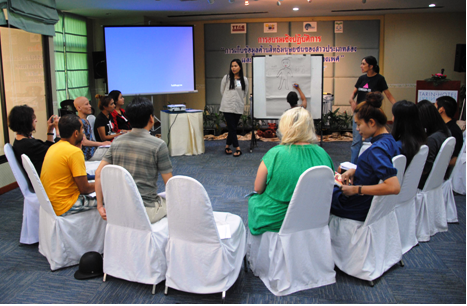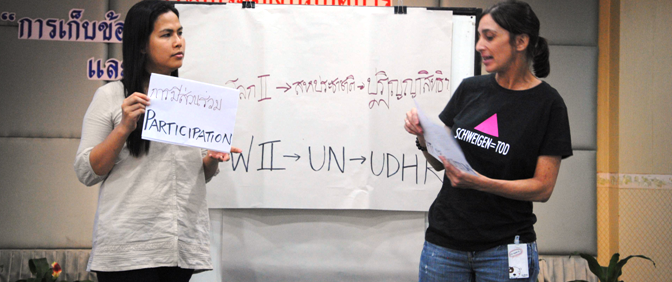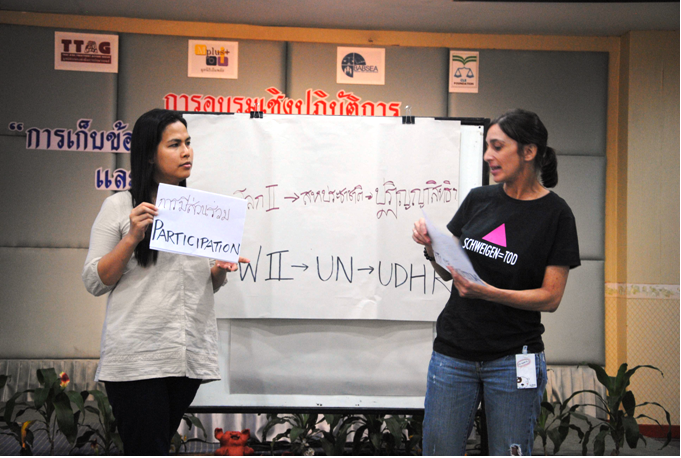By Ellen Rehnberg, Mount Holyoke College, USA
 It probably will not surprise anyone to learn that there is a large number of transgendered people in Thailand. What is surprising is the amount of discrimination they face. I did not know this when I first started working on a project to document human rights abuses in the transgender community in Chiang Mai as part of my summer internship with BABSEACLE. To be honest, I did not know about the problems of any transgender community before I met Nada Chaiyajit, a lively, passionate transgender activist well-known in Thailand.
It probably will not surprise anyone to learn that there is a large number of transgendered people in Thailand. What is surprising is the amount of discrimination they face. I did not know this when I first started working on a project to document human rights abuses in the transgender community in Chiang Mai as part of my summer internship with BABSEACLE. To be honest, I did not know about the problems of any transgender community before I met Nada Chaiyajit, a lively, passionate transgender activist well-known in Thailand.
The transgender community in Chiang Mai is very visible. A transgender cabaret show is a major tourist attraction. After hours, many transgender people work in bars and as sex workers. I was not surprised that their involvement in sex work was high, since Thailand is known for its sex industry, but what I didn’t know was why so many become sex workers and how they are treated.
Law and Identity
According to Thai law, Kathoey are free to change their bodies, but they can never change their gender. Someone who is born male but feels they were born in the wrong body and goes through several operations to have a female body, is still considered male by law… and by society. They cannot change their gender on their passport or national ID card. They face discrimination in employment, and for many, sex work is the only way to secure an income. As sex workers, they face many human rights abuses and have little protection.
In addition, there is a lack of information on the special needs of transgender with respect to safe sex, health care, and legal and human rights. To address these needs, Nada, with support from BABSEACLE partner M+Plus, started a program called Sexperts! It is a very successful online counselling service for and by transgender people. In recognition of her work, Nada was invited to speak at the UNAIDS 2012 international conference in Washington, DC, in July.
The project I volunteered for consisted of holding a two-day workshop together with Karyn Kaplan from the TTAG organization for transgender in Chiang Mai, with whom we were also writing up teaching materials about transgender legal and human rights.
The aim of the workshop was to get the different groups of transgender in Chiang Mai (the entertainers working in the Cabaret, the bar workers and the sex workers) to network in order to support one another. We also wanted to share basic legal skills, to emphasise that transgender have the same legal rights as everyone.
Karyn and Nada emphasized how important it is that they support each other as a community and that they report the abuses they experience so that together they can fight for their rights and reduce the discrimination and stigma they are subjected to.
There were challenges. Because sex workers work all night, we had very few participants in the morning and I learned from the beginning how important flexibility is when working with different kinds of people with different needs. On the second day, we changed our schedule.
We had 14 participants and the follow-up outreach we did after the workshop showed that these 14 were community leaders who had talked to many friends about how important the experience had been. They got to network, made new friends facing the same issues and now know where to go when they need help. Most important of all might be that they were heard, accepted and empowered to be themselves with rights and dignity.
Advocacy is about working for what you believe in. The passion I have seen when working with Nada and others on this project has convinced me that advocacy can bring change. Furthermore, I got to experience the joy and warmth of the transgender community and I thank them for making me one of their sisters.


